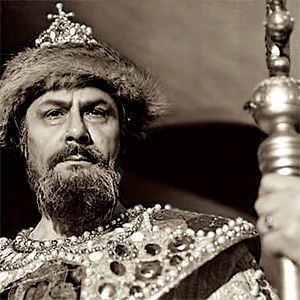“I am not at all fond of the word “legend”, I am a down-to-earth person and an artist. But if I would have to say something about it, it would be “I was recognized as the best basso cantabile in the world.” These words are from one of the last interviews Niolya Gyuzelev gave. Le Monde describes his voice as a “constellation of gems”. Since the very start of his career he was compared to the Russian colossus Feodor Chaliapin and to Boris Christoff. Here is but a small part of what critics have said about him:
“The expressive face, the eyes that speak volumes – with tears of anguish or ice-cold and cruel, or with a wicked glint… And then the voice resounds – covering the entire vocal range, a deep and beautiful basso. As an actor, Gyuzelev shines with an inner energy and passion, with a deep emotional potential, painting striking emotional pictures. And his gestures – so expressive, gentle and timid, so challenging or forgiving. Ever energetic, they are a refined and precise evocation of his mindset as a performing artist, making his stage characters complete to perfection.”
From a very early age, Nikola’s life was all about music and painting. At age 11 he performed the leading role in “The young violinist” in the town where he was born, Pavlikeni. At different times in his adolescence he believed he would become a great painter, an unrivalled singer or a future Paganini.
Here is what Nikola Gyuzelev remembers of his first contact with music:
 “My father loved to play the violin. He was a self-taught violinist and would play classics by Mozart, Beethoven, Boccherini. He got me a tutor from our town – for one reason or another he had stayed on in Pavlikeni and was teaching music. It gave me such pleasure to go there, but, as all children, I can say – I still had the feeling it was a chore. Music was something I loved, the violin beckoned to me, yet it was unpliable and took a lot of hard work.”
“My father loved to play the violin. He was a self-taught violinist and would play classics by Mozart, Beethoven, Boccherini. He got me a tutor from our town – for one reason or another he had stayed on in Pavlikeni and was teaching music. It gave me such pleasure to go there, but, as all children, I can say – I still had the feeling it was a chore. Music was something I loved, the violin beckoned to me, yet it was unpliable and took a lot of hard work.”
Nikola Gyuzelev heard the monologue of Boris Godunov from the opera by Mussorgsky for the first time when he was 15 and was simply bewitched. Years later, when asked why the monologue of Boris made such an impression on him, Nikola Gyuzelev answers:
“It was the melody itself that captured my imagination - at the time I couldn’t even hear the words. The way the voice rises, as if in flight. But as I said that is something that could have happened or not, still my life would have been devoted to opera.”
Nikola Gyuzelev’s family moved to Sofia and he continued to sing, play the violin and paint. He applied and was admitted “Painting” at the Art Academy, where he displayed a vivid talent and a masterly technique of painting. In 1960, after he had graduated the academy with honours, he was offered a contract in Berlin and was getting ready to go when he met music pedagogue Hristo Brumbarov and that meeting changed everything. Brumbarov was the man who discovered his talent; he also discovered singers like Ghena Dimitrova, Nikolay Gyaurov and Aron Aronov. Gyuzelev stayed on in Bulgaria to study singing with him.
In June 1961 he made his debut on the stage of the Sofia Opera as Timur from Puccini’s opera Turandot. In 1962 he won a gold medal at the international youth festival in Helsinki. He says that it was this prize that motivated him to continue as a professional singer. By 1963 he was holder of first prize and a gold medal at the International Competition for Young Opera singers in Sofia. Success had come after just two seasons on the professional stage.
Nikola Gyuzelev was to become one of the world’s top opera singers. He sang on the leading opera stages of Europe, North and South America, Japan: La Scala - Milan, San Carlo – Naples, Covent Garden – London, Grand Opera – Paris, Bolshoi Theatre – Moscow, the Metropolitan – New York, Colon – Buenos Aires and many more. His mission, to pass on the magic of opera, was accomplished.
At the end of his long career, Nikola Gyuzelev’s legacy was a music gallery of more than 70 characters from Russian, Italian, French and German operas. Nikola Gyuzelev passed away in 2014.
The audio file contains the following works:
- Aria of Figaro, Mozart;
- Monologue of Boris Godunov, Mussorgsky;
- Recitative and serenade of Mephistopheles, Berlioz.
English version: Milena Daynova
Several dozens of medical workers were arrested in Benghazi on 9 February 1999, 23 Bulgarians among them. Most of the people were released in a few days. Nurses Kristiana Valcheva, Nassy Nenova, Valentina Siropulo, Valya Chervenyashka..
Todor Zhivkov was born on 7 September 1911 in Pravets and, as of 1932 was a member of the Bulgarian Workers’ Party (communists). In 1948 he became a member of the Bulgarian Communist Party Central Committee and, in 1954, was elected..
After the collapse of the socialist government of Zhan Videnov, the caretaker government, headed by Stefan Sofianski managed to calm down the social and political situation in Bulgaria, gaining back the trust of the international..

+359 2 9336 661
